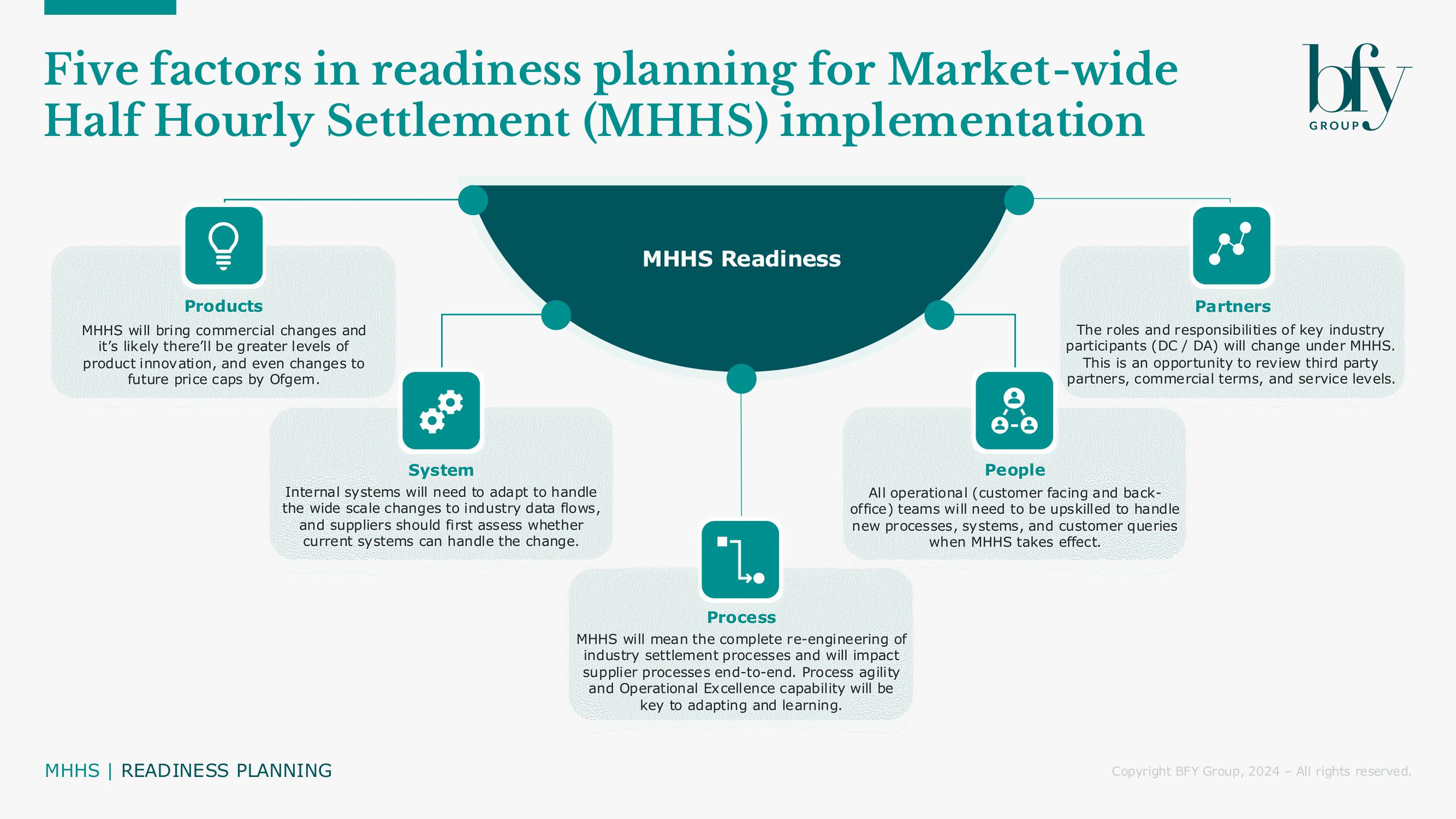With Ofgem’s deadline for Market-wide Half Hourly Settlement (MHHS) expected to be pushed back to May 2027, organisations have an invaluable opportunity to act now, get ahead of the implementation timeline, and gain a competitive advantage.
While the delay provides more time for preparation, this cannot be treated as a luxury - using it to your advantage is a strategic imperative.
MHHS represents the most fundamental change to the electricity market since privatisation, impacting everything from pricing structures to operational processes, people, and customer experience.
We're already seeing the benefits from suppliers leading the way with dynamic tariffs – enabling customers to save significant amounts through load shifting, with flexibility a key enabler for the energy transition.
In our work to date, we’ve seen that suppliers who aren’t already on this journey are significantly behind the curve when it comes to dynamic tariff adoption, with leading suppliers having delivered a number of path finder programmes already.
This delay offers a new window to proactively build resilience, align on strategic goals, and set yourself up for success under the transformed settlement regime.
Previously in our MHHS series, we highlighted a major commercial risk worth hundreds of £millions ahead of implementation. Below, we’ve delved deeper into the broader challenges facing suppliers, sharing a five-step approach to MHHS readiness that sets you up to be winner when the reform takes effect.
What suppliers need to know about Market-wide Half-Hourly Settlement (MHHS)
- Market-wide Half Hourly Settlement (MHHS) will impact all parts of the supplier value chain
- Implementation will result in substantial change to back-office processes, systems, and 3rd party relationships
- Settlement timescales will shorten significantly, reducing by 70%, to 4 months from 14
- Customer facing teams will need to adapt to complex customer queries around dynamic time-of-use (TOU) tariffs and half-hourly (HH) billing
- Suppliers must demonstrate readiness for MHHS changes and requalify, or risk being prevented from taking on new customers
Overall, changes in customer tariffs, customer usage patterns, and complete reengineering of billing and settlement processes will impact suppliers end to end.
Challenges to overcome for MHHS implementation
- Major tech and process changes are required, with potentially challenging timescales in which to complete
- Large-scale training and up-skilling is needed across the energy specialist population
- Changes to the 3rd party landscape, most likely resulting in changes to existing relationships and commercial terms
- The volume of smart meters operating in traditional mode which delay the timely collection of consumption data required for settlement
- Financial risk due to shortened settlement timetable which means everything must be done faster, with less opportunity for correction further down the line
- Failure to comply with changes can pose risk to electricity supplier licence and ability to acquire new customers
Five-step approach to MHHS readiness
It’s essential that internal delivery programs consider the wide implications of MHHS across the organisation, developing robust plans and delivery mechanisms that achieve the required outcomes.
We recommend taking a five-step approach to business readiness planning:
1) Products
MHHS will bring changes to the commercial landscape and it’s likely there’ll be greater levels of product innovation, and even changes to future price caps by Ofgem to accommodate this.
Ask yourself these questions to aid your preparation:
- Do you have a clear view of your future product strategy?
- If not, how do you future proof your systems and processes?
TOU tariffs will drive changes in customer behaviour - trading and products will need to evolve with this.
2) Systems
Internal systems will need to adapt to handle the wide scale changes to industry data flows, and suppliers should first assess whether current systems can handle the level of change required.
- Do your current systems give you a foundation to build from when MHHS takes effect?
- Can these systems support the increase in data, and handle new tariffs and products?
- If they can, how will you ensure they’re working correctly on day one?
Controls will be key to identifying and reacting to post go live file flow issues.
3) Process
MHHS will mean the complete re-engineering of industry settlement processes and will impact supplier processes end-to-end.
- How can you get ahead with data cleanse and backlog reduction activity prior to cut over?
Process agility and Operational Excellence capability will be key to adapting and learning as you go.
4) People
All operational (customer facing and back-office) teams will need to be upskilled to handle new processes, systems, and customer queries when MHHS takes effect.
- Is this level of upskilling achievable given your current operating model setup?
This will be the start of a migration from a model office environment to BAU, and is likely to require bubble resource factoring into MTP forecasts.
5) Partners
The roles and responsibilities of key industry participants (DC / DA) will change under MHHS.
- Do you know how your existing partners are preparing for MHHS?
This is an opportunity to review third party partners, commercial terms, and service levels to ensure you’re set up for success in MHHS.

Use the delay to your advantage
As shown above, successful MHHS implementation will require significant input from all areas of an organisation. Additional preparation time afforded by a delay should be treated as an invaluable opportunity to get ahead, rather than a reason to slow down.
Suppliers who act now, by building robust readiness plans and testing their resilience, will be best placed to emerge as market leaders when MHHS takes effect. Failing to capitalise on this opportunity could leave you scrambling to retrofit systems and train teams at the last minute - putting your license to operate and competitive position at risk.
For more on MHHS, and the potential impact on your organisation, contact Jon Vincent.
This is the second instalment in our MHHS Readiness series – look out for more insight from the team in the coming weeks, and join our mailing list here.
Jon Vincent
Client Director
Jon helps clients resolve problems with billing, settlements, and customer service.
View Profile

